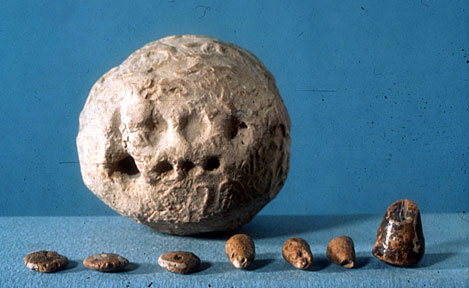1. Tokens as Precursor of Writing
The direct antecedent of the Mesopotamian script was a recording device consisting of clay tokens of multiple shapes (Schmandt-Besserat 1996). The artifacts, mostly of geometric forms such as cones, spheres, disks, cylinders and ovoids, are recovered in archaeological sites dating 8000–3000 BC (Fig. 1). The tokens, used as counters to keep track of goods, were the earliest code—a system of signs for transmitting information. Each token shape was semantic, referring to a particular unit of merchandise. For example, a cone and a sphere stood respectively for a small and a large measure of grain, and ovoids represented jars of oil. The repertory of some three hundred types of counters made it feasible to manipulate and store information on multiple categories of goods (Schmandt-Besserat 1992).

(Fig. 1) Envelope, tokens and corresponding markings, from Susa, Iran (Courtesy Musée du Louvre,
Département des Antiquités Orientales)
The token system had little in common with spoken language except that, like a word, a token stood for one concept. Unlike speech, tokens were restricted to one type of information only, namely, real goods. Unlike spoken language, the token system made no use of syntax. That is to say, their meaning was independent of their placement order. Three cones and three ovoids, scattered in any way, were to be translated ‘three baskets of grain, three jars of oil.’ Furthermore, the fact that the same token shapes were used in a large area of the Near East, where many dialects would have been spoken, shows that the counters were not based on phonetics. Therefore, the goods they represented were expressed in multiple languages. The token system showed the number of units of merchandize in one-to-one correspondence, in other words, the number of tokens matched the number of units counted: x jars of oil were represented by x ovoids. Repeating ‘jar of oil’ x times in order to express plurality is unlike spoken language.

